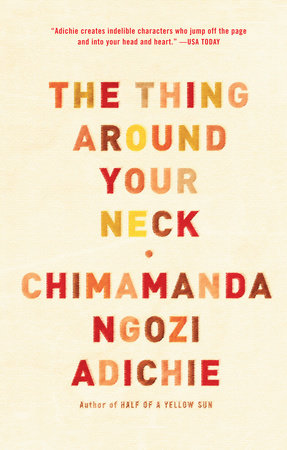Reading Group Center
- Home •
- Books by Category •
- Imprints •
- News •
- Videos •
- Media Center •
- Reading Group Center
The Thing Around Your Neck
By Chimamanda Ngozi Adichie
The questions, discussion topics, and reading list that follow are intended to enhance your reading group's discussion of The Thing Around Your Neck, the richly evocative collection of stories by Chimamanda Ngozi Adichie.
1. Cell One:
• “Boys who had grown up watching Sesame Street, reading Enid Blyton, eating cornflakes for breakfast, attending the university staff primary school. . . . were now cutting through the mosquito netting of their neighbors’ windows, sliding out glass louvers, and climbing in to steal TVs and VCRs” (p. 5). Why is this happening?
• Nnamabia’s early transgressions are forgiven without punishment. Are his parents responsible in some way for his eventual criminal activity? Is he truly innocent, as his mother insists?
• How does the old man change Nnamabia? Why does he affect him this way?
• Why did Adichie choose this story to lead the collection?
2. Imitation:
• What is the metaphor of the masks? And the significance of an original versus a copy?
• On page 26, Adichie writes about America’s “abundance of unreasonable hope.” What does this mean, in this story and in the collection as a whole?
• Why is it expected that men will be unfaithful, but women will not? What prompts Nkem to finally speak up?
3. A Private Experience:
• What kinds of assumptions does Chika make about the Muslim woman?
• Chika “wonders what purpose this lie serves, this need to draw on a fictional past similar to the woman’s” (p. 50). Why do you think she tells this lie?
• What does the title mean?
• Why does Chika ask to keep the scarf?
4. Ghosts:
• How much do you know about the Nigerian Civil War, the war James and Ikenna are discussing? How much does the reader need to know?
• “Ikenna, I have come to realize, is a man who carries with him the weight of what could have been” (p. 66). What prompts James’s realization? What weight does James carry?
• What is the significance of Ebere’s visits?
5. On Monday of Last Week:
• What is Adichie trying to say about American parenting?
• How does what happened on Monday change Kamara’s attitude? Why does Tracy have this effect on her?
6. Jumping Monkey Hill:
• How does Edward’s image of Africa differ from Ujunwa’s reality? What does this story tell us about white people’s attitudes towards Africans?
• On page 103, Ujunwa says she is not writing about her father “because she had never believed in fiction as therapy. The Tanzanian told her that all fiction was therapy, some sort of therapy, no matter what anybody said.” Discuss the nature of fiction, especially in terms of the story Ujunwa ultimately writes.
• How does Edward’s suggestion to Ujunwa, “I’d rather like you to lie down for me” (p. 106), affect Ujunwa? How does it inform her response to his critique of her story?
7. The Thing Around Your Neck:
• Tonally, this story is quite different from the others. Discuss the differences. Why is it the title story for the collection?
• When “your” uncle says that “America was give-and-take” (p. 116), what did you think he meant?
• What is “the thing around your neck”? What finally loosens it?
• Do you think “you” will return to him?
8. The American Embassy:
• “It was not courage, it was simply an exaggerated selfishness” (p. 136). Is the woman’s assessment of journalists accurate? Or is she merely thinking of her husband?
• Why doesn’t she tell the interviewer about Ugonna’s death?
9. The Shivering:
• What role does religion play in this story? What about faith?
• How does Chinedu’s homosexuality affect the story? Compare the American and Nigerian attitudes towards homosexuality.
10. The Arrangers of Marriage:
• On page 172, Ofodile tells Chinaza, “If you want to get anywhere [in America] you have to be as mainstream as possible.” Do you agree with him? Ultimately, does Chinaza?
• Do you think Chinaza will do as Nia suggested, and leave her husband once she gets her papers? Why?
11. Tomorrow Is Too Far:
• In this story, as in several others, a brother receives preferential treatment over his sister. How do Nigerians’ attitude towards women differ from Americans?
• What drives the main character to cause Nonso’s death? Is it murder? Why doesn’t Dozie stop her, or tell on her?
• Discuss the last paragraph of the story. Why do things turn out the way they do?
12. The Headstrong Historian:
• Why do you think Adichie chose to end the collection with historical fiction? How does it affect your understanding of some of the other stories’ characters’ motivations?
• Nwamgba believes firmly in things like destiny. Which of Adichie’s contemporary characters share that belief?
• How does Nwamgba’s plan for her son to learn English backfire? How does it pay off?
• Why does Grace change her name? What destiny is she fulfilling?
13. General Questions:
• Do Adichie’s stories have morals? How do they build upon each other? What is the moral of the collection as a whole?
• Many of the stories involve the influence of the West, particularly America, on Nigerian life. What point is Adichie trying to make? Which characters are happier, those who live in the U.S., or in Nigeria?
• How do differences in class, education, religion, and ethnicity come into play, both in America and in Nigeria?
• Discuss the importance of food in these stories. What does it signify?
(For a complete list of available reading group guides, and to sign up for the Reading Group Center enewsletter, visit www.readinggroupcenter.com)


